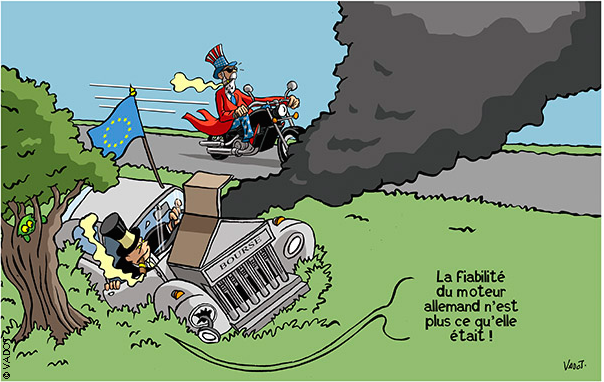Giuseppe Sandro Mela.
2017-10-03.
Sono accaduti due fatti nuovi, ancora da valutare nella loro reale portata.
Francia. Senato. Macron disintegrato: 22 seggi contro 150 dell’opposizione.
Germania. Débâcle per Frau Merkel ed Herr Schulz. -153 deputati.
E non è finita mica qui,
Austria. Il 15 ottobre elezioni politiche.
Repubblica Ceka. Elezioni politiche di ottobre.
Ed il 15 ottobre si voterà anche nel Land Niedersachsen.
*
La devoluzione del socialismo ideologico europeo e mondiale sta volgendo al suo epilogo. Ma attenzione: la morte dell’ideologismo non significa la morte degli adepti.
Questo è il mesto titolo del Der Spiegel:
End of an Era? The Slow Death of Europe’s Social Democrats.
Questo è il giudizio tranchant dei cinesi:
Germany: End of an era.
*
Concordiamo. Sta finendo un’era, anche se ciò non è ancora ben percepito dalla gente comune, che ha ben altro per la mente cui pensare: sbarcare il lunario in un clima socio economico sempre più deteriorato.
In primo luogo, ha cessato di esistere funzionalmente l’Alleanza Progressista, ossia l’erede della fu Internazionale Socialista. Organizzazione egemone dei destini mondiali quando al governo vi erano i liberal democratici americani, la socialdemocrazia in Germania, i socialisti in Francia, Austria, paesi scandinavi, Spagna e laburisti nel Regno Unito, per decine di anni ha diretto e piegato i destini del mondo occidentale portandoci ai risultati odierni, che sono sotto gli occhi di tutti. Era all’interno della Internazionale Socialista prima, di Alleanza Progressista dopo, che è nata l’attuale Unione Europea, così come la conosciamo.
Al momento attuale non ha più nessun partito suo componente al governo, ma burocrazia e parastato di tutte le nazioni che la compongono ha personale tutto da essa ancora dipendente. Serviranno svariati lustri per bonificare queste situazioni.
In secondo luogo, nessun capo di governo che sieda nel Consiglio Europeo ha una solida base in patria: sono quasi tutti lame duck, anitre zoppe. Le recenti elezioni hanno dimostrato numericamente quanto in realtà valga Frau Merkel e Mr Macron. Difficilmente potranno piegare il Consiglio di Europa ai loro volere ed interessi. Chaos politico che coincide con la delicatissima fase di tapering da parte della Banca Centrale Europea.
In terzo luogo, al di là degli annunci roboanti, la situazione economica europea è al limite della catastrofe. Ed il futuro non può essere altro che peggiore.
Germania. La demografia che stritola. Mancano tre milioni di lavoratori.
Germania. La malata di Europa. 68 banche nei triboli. – Bundesbank.
Germania. Non è povera. È misera. – Financial Times
La crisi demografica inizia a mordere quel po’ che resta del tessuto sociale e produttivo.
Siamo chiari: il rischio di un tracollo dell’Eurozona è tutt’altro che remoto. Alla fine i debiti dovranno essere ripagati: tutti ed anche con gli interessi.
* * * * * * *
«Macron ran for the French presidency on a pledge to “relaunch” Europe, in tandem with Germany, after years of economic and financial crisis and the new shock dealt by Britain’s vote last year to leave the bloc»
*
«Macron has called for a finance minister and budget for the single currency bloc, ideas that Merkel has tentatively supported even though scepticism in her own party runs high»
*
«But with the FDP as a partner and the AfD pushing back loudly in parliament, the prospect of selling deeper European integration to her new coalition and the wider public looks far more challenging»
*
«A Bertelsmann Foundation survey last year showed just 41 percent of French believe Europe needs more political and economic integration, 10 points below the EU average.»
*
«The survey also showed that Germans and French are the most skeptical toward Macron’s ideas for a European finance minister and dedicated euro zone budget.»
*
«Only 31 percent of French and 39 percent of Germans thought a euro zone budget should be used to support economically weaker states, as Macron suggests»
